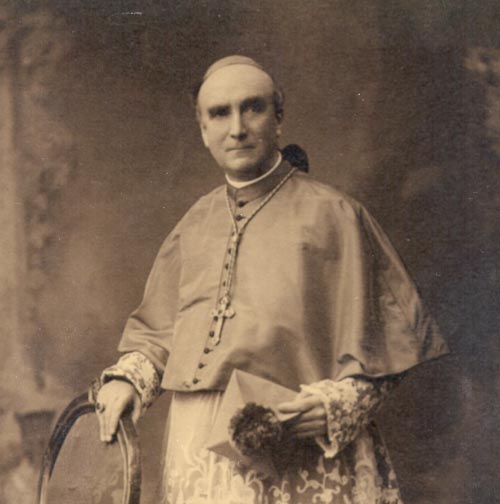Edward Patrick Roche
Born Placentia, 1874; Roman Catholic

Courtesy of Archives and Special Collections (Collection 185), Queen Elizabeth II Library, Memorial University of Newfoundland, St. John's, NL.
Edward Patrick Roche was born on 19 February 1874 in Placentia into a well-to-do Roman Catholic family. He received his education at St. Bonaventure's College in St. John's and at All Hallow's College, Dublin where in 1897 he was ordained. He followed his vocation in Conception Bay South until he was appointed to the Cathedral in St. John's and became the Vicar General of the Archdiocese of St. John's in 1907. He was consecrated archbishop in 1915 on the death of Michael Francis Howley. Despite his fragile heath - he suffered from tuberculosis - Roche had a long episcopate, which lasted until his death in 1950.
Roche proved to be an able administrator, who organized and expanded education and churches in his diocese. He was also the driving force behind the building of St. Clare's Mercy Hospital in 1922. Early in his career Roche had the reputation of being a particularly sensitive spiritual director and confessor, although his illness and residence at Beaconsfield, as well as his penchant for elaborate liturgical celebrations, earned him the reputation for being remote and regal.
The campaign for confederation found in him one of its fiercest opponents. The bishop's opposition, however, cannot be attributed entirely to a quest for power. Besides concerns that confederation would endanger denominational education, and that permissive divorce laws would threaten the traditional Roman Catholic view of the family, it was especially Newfoundland's political and ecclesiastical history that seems to have shaped Roche's views on confederation. Not only could the achievement of responsible government in 1855 be seen as a victory of the Roman Catholic dominated Liberal party, but also independence from Canada was an inheritance of the nineteenth century that could not be given up easily. Thus the archbishop argued through the pages of The Monitor, the diocese's Roman Catholic monthly, that before confederation could be thought of, responsible government - as promised by Britain - should first be restored. Roche's view was not shared, however, by his fellow bishop on the west coast, Michael O'Reilly, who supported confederation with Canada. While Roche's colleague, Bishop John Michael O'Neill of Harbour Grace, who had also opposed confederation, quickly adjusted to the new political realities after the second referendum, the archbishop never reconciled himself to confederation. He died on 23 September 1950.




